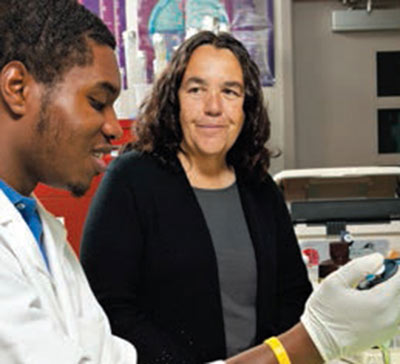
Faculty Mentor Olivia Martinez Builds Confidence in the Lab
Amgen Scholar faculty mentor Olivia Martinez grew up in East Los Angeles and was a first-generation college student in her family. As a young girl, science and math had been her favorite, and she had a natural aptitude for the subjects. But she didn’t have a professional scientist or faculty mentor who could show her how her passion could translate into a career path.
Martinez was able to participate in hands-on research as an undergraduate at the University of Southern California in Los Angeles despite there being few opportunities at the time. Her decision to become a scientist crystalized further when she took a class in immunology. “I loved the topic and I loved the class, and I decided—I guess, naively in retrospect—that I was going to go to graduate school and study immunology,” she says, in part because she wanted to positively impact human disease. In graduate school at the University of California, Berkeley, Martinez finally received the career mentorship she needed from her adviser, Leon Wofsy, and blossomed as a scientist in large part because of the guidance he provided.
Now Martinez is director of the graduate program in immunology at Stanford University School of Medicine, where she leads a group to study immune responses to diseases as well as stem cell and solid organ transplantation. She has mentored two exceptional Amgen Scholars, Alexander Ballard and Trinidad Cisneros. Reflecting back on her own early travails in science reinforces for her the importance of giving undergraduates opportunities in research and building their confidence.
We asked Martinez more about her mentorship experiences and philosophies, and here’s what she said.
What has your experience been like with the Amgen Scholars?
I’ve found them to be very enthusiastic about experiencing what research is like. They grasp the opportunity and make the most of it. I’ve been very pleased with them.
When did you first mentor someone, and what did you learn from that?
My first mentoring experience goes back to graduate school, when I was a graduate student at UC Berkeley. I had an undergrad who was in the lab for the summer and was assigned to work with me. That was when I realized that mentoring is more than just teaching somebody how to do a technique or guiding them through a project — that it requires taking into account the person in terms of his or her background, training, and personality. I learned that being an effective mentor required a lot of skill, insight, and training. It’s something [scientists are] continually working on. Even now, each student who comes into the lab brings different facets to how you approach mentoring.
What are the most important lessons that undergraduates learn in your lab?
The important takeaway is for them to see what research is like on a day-to-day basis and to decide if it’s something that’s for them, because I don’t think it’s for everybody. Whether they are intrigued by research and want to do it again or they decide, ‘This isn’t for me’—I think those are both positive outcomes. I’m trying to show them all facets of the process, from understanding what a research problem is and how you approach it to what specific techniques are involved in answering that question.
The other lessons are learning how to work in a team environment and communicate effectively—both important skills for any future career. Our lab functions as a collaborative unit, and students come away understanding that that’s the best way to thrive in the lab. We work a lot on communication—and in particular, presenting research—especially at weekly lab meetings.
It sounds like you’re building their confidence.
I’m trying. I remember that it can be intimidating—especially if you’re coming from a background like mine, with no exposure to anybody or anything in science—to walk into a lab at a major university and train alongside people you view as intelligent and accomplished. The message to students is, ‘We’re all here because we’re interested in learning something new, and you can be part of this. Your thoughts and ideas are valued.’ I try to give them the courage to feel like they’re amongst colleagues.

